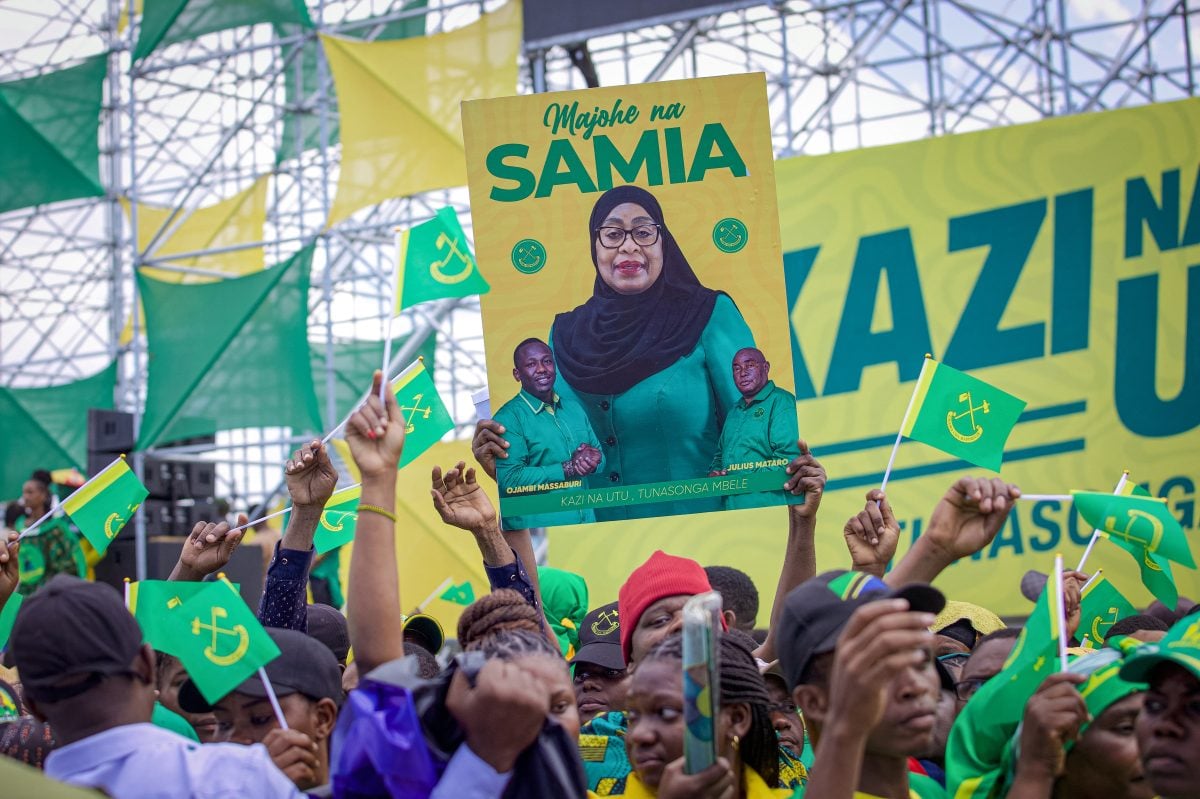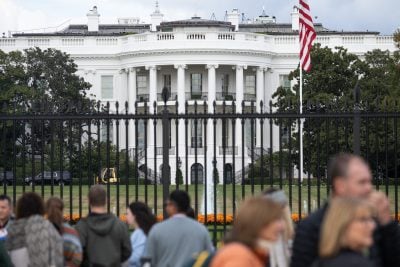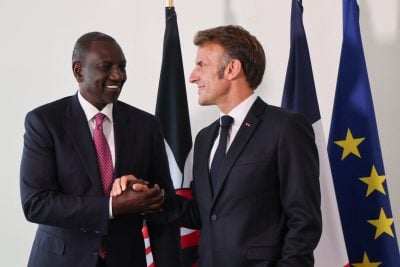Tanzania’s president Samia Suluhu Hassan is widely expected to win a second term in power when Tanzanians cast their ballots in the country’s general elections on 29 October.
Hassan – who became the first woman to lead the country in 2021 on the death of predecessor John Magufuli – will face off against 16 other candidates cleared by the country’s electoral commission. But observers say the polls are not much of a contest given that the head of the country’s main opposition party has been barred.
Tundu Lissu, chair of Chadema, Tanzania’s main opposition party, has been in police custody since April on charges of treason – a capital offence that is not eligible for bail. Lissu was arrested after urging his supporters to boycott the elections unless substantive electoral reforms were implemented.
He was bundled into a police vehicle after he finished addressing a public rally in Mbinga in southern Tanzania. A few days following his arrest, the Chadema party was disqualified from the presidential and parliamentary elections after refusing to sign an electoral code of conduct. The party said that the code did not reflect the reforms that its leader and members had long advocated for.
A procedural coronation
Lissu ran against Magufuli in the 2020 general elections, securing 13% of the vote compared to Magufuli’s 84.4%. Following his defeat, he rejected the outcome of the election, citing widespread election fraud. The vote was marked by low voter turnout, with only half (50.72%) of registered voters participating. The move to exclude Lissu from this year’s elections has sparked criticism that democracy is in retreat in Tanzania, with some fearing even greater voter apathy as a result.
The European Parliament passed a resolution in May condemning Lissu’s arrest and described the charges levelled against him as “politically motivated”. It urged Tanzanian authorities to “end the escalating crackdown” on members of the opposition, activists, journalists and civil society organisations. In response, Tanzania’s authorities criticised the European lawmakers for interfering in the country’s internal affairs.
Tanzania’s ruling CCM party, which Hassan chairs, has been in power since independence, and has won every election since the country held its first multiparty elections in 1995. With the opposition Chadema party sidelined, victory in the upcoming election is almost a foregone conclusion.
Nicodemus Minde, a researcher at the Institute for Security Studies who focuses on East Africa, argues that voting in Tanzania “has been reduced to a procedural coronation ritual for the ruling party”.
He says the ruling party has moved from winning 58% of the vote in 2015, to 84% in the 2020 and 99% in the 2024 local government elections.
“Tanzania is sliding into electoral authoritarianism – a system where polls are held, but within a manipulated process where the ruling party retains power through state control, patronage, violence, intimidation and manipulation of electoral systems,” Minde writes.
Foreign investors stay put
Despite mounting concerns over Tanzania’s democratic trajectory, foreign investor confidence remains strong, with capital inflows reaching record levels in the past year. According to the United Nations Conference on Trade and Development (UNCTAD), Tanzania attracted $1.72bn in foreign direct investment (FDI) in 2024, a 28.3% increase from $1.34bn in 2023. The country recorded inflows of $1.1bn in 2022, $1bn in 2021 and $944m in 2020.
The IMF expects growth of 6% this year, building on 5.4% in 2024 and 5.1% in 2023.
One reason that investor confidence has held firm is Tanzania’s reputation for peace and stability. Since independence the country has not experienced civil war or major internal strife — making it one of the region’s more secure and predictable investment destinations.
Tanzania’s abundant mineral reserves have also put it on the radar of global investors, with international mining firms lining up to invest in the country’s extractives sector. Gold mining in particular has captured investor attention, says Anna Rabin, managing director of Above Ground Advisory, a Dar es Salaam-based consulting firm specialising in the extractive industries.
“In terms of what sectors are driving FDI, obviously mining is one of them. A lot of this is driven by global commodity prices, particularly gold which has done well in recent years,” she tells African Business.
Gold’s price has surged 40% in a year, on top of a 25.5% increase in 2024. Analysts attribute this to a confluence of factors ranging from central bank accumulation, to investor flight to safe-haven assets and the expectation of monetary easing.
Gold’s blistering rally has led to an uptick in exploration projects in countries with significant gold deposits such as Tanzania, which relies on the precious metal for a considerable portion of its export earnings. Tanzania earned $3.98bn from gold exports in the 12 months ending July 2025, up 26.3% year on-year. During this period gold accounted for 36.8% of total exports, making it the largest single commodity in the country’s export basket.
“There’s a $700m investment by an Australian company in a gold project this year. When the mining sector does well and attracts large scale investment, that boosts FDI numbers,” Rabin says in reference to the Nyanzaga gold project in the northwest of the country.
Construction on the project, owned by Perth-based Perseus Mining, commenced in August and production is slated for the first quarter of 2027. Over its projected 11-year lifespan, the mine is expected to yield 2.01m ounces of gold.
Beyond gold, rising global demand for energy transition minerals is another significant driver of foreign investor interest in Tanzania’s extractives sector, Rabin notes.
“The requirements for new materials as part of the energy transition has seen Tanzania become more interesting to exploration companies,” she says. “Tanzania is traditionally known for gold, coal, diamond and tanzanite [a semi-precious gemstone]. However, Tanzania has an abundance of minerals such as graphite, nickel, heavy mineral sands and helium – all necessary to the transition – and this has sparked interest.”
Expand economic reforms
To enhance the country’s appeal to foreign investors and increase capital inflows even further, Rabin says Tanzanian authorities need to expand economic reforms, citing the need for simplified regulatory frameworks and streamlined fiscal policy.
“A lot of investors have concerns about overregulation and inconsistent regulation. This is both in terms of how regulation is applied and in terms of potential changes in the regulatory environment,” she notes. “That has been a concern over the past decade for foreign and local investors alike, particularly in subsectors of the economy that are capital intensive and require long-term horizons,” she adds.
On the fiscal front, she notes that recent changes to tax laws have made it harder for existing investors to reinvest their capital. “There are a couple of things that may deter reinvestment, such as the Finance Act that came out in July. It effectively applied withholding tax on retained earnings, so it’s not incentivising reinvestment.”
“That is something that could be looked into. If we want to encourage existing investors to reinvest, a withholding tax on retained earnings is counterproductive,” she argues.
“Going forward, the focus should be on encouraging investors, both foreign and local, to reinvest in Tanzania – encouraging the people who understand Tanzania and already have a presence here to look for additional or different business opportunities,” she contends.
Infrastructure boom
Rabin says that increased investments in infrastructure – from road to rail and power projects – has helped to improve Tanzania’s overall competitiveness. Nevertheless, she argues that more must be done to improve the reliability of power supply and bridge the energy access gap.
“There have been improvements to the road networks in recent years. However, power gaps continue to be more of an issue than road networks in Tanzania. Generation has increased since the Julius Nyerere hydropower project [a 2,115 MW Chinese-built plant] coming online, but more still needs to be done in terms of transmission and distribution of power.”
According to the World Bank, some development programmes in Tanzania’s energy sector, such as expanding access to electricity, have delivered encouraging results. Indeed, the proportion of Tanzanians with access to electricity increased from 7% in 2011 to 48% according to the World Bank in 2023. However, critical gaps remain in other areas.
Tanzanian policymakers, the World Bank says, must intensify efforts to strengthen human capital to improve productivity. They must also promote private sector-led growth and strengthen the country’s resilience to external shocks and climate change.
Want to continue reading? Subscribe today.
You've read all your free articles for this month! Subscribe now to enjoy full access to our content.
Digital Monthly
£8.00 / month
Receive full unlimited access to our articles, opinions, podcasts and more.
Digital Yearly
£70.00 / year
Our best value offer - save £26 and gain access to all of our digital content for an entire year!

 Sign in with Google
Sign in with Google 



